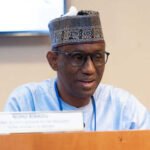The statement by Nigeria’s Minister of Power, Adebayo Adelabu, over government’s commitment to end estimated electricity billing by the end of 2024 does not inspire confidence.
Development Diaries reports that the minister said this when he visited the Ibadan Electricity Distribution Company (IBEDC).
‘Before the end of this year, we are looking at the possibility of ending estimated billing because we want transparency and objectivity in our billing system’, he said.
The expression ‘we are looking at the possibility’ does not inspire confidence that much will be done to solve the problem of estimated billing in the nation’s energy sector.
Even though Nigeria has one of the biggest economies in Africa, it also has one of the biggest energy deficits globally. Over 4.6 million Nigerians are on the estimated billing system, despite government efforts, according to the IOP Conference Series: Earth and Environmental Science.
In July 2023, the House of Representatives directed the Nigerian Electricity Regulatory Commission (NERC) to prevail on distribution companies to stop the estimated billing of electricity consumers across the country.
Also, an NOI poll conducted in May 2023 showed that 57 percent of electricity consumers were overcharged with estimated billing and only 57 percent of electricity consumers are metered.
According to the findings, 43 percent of the respondents disclosed that they did not have prepaid meters.
Despite various attempts by the NERC to reduce the metering gap in recent years through various means, such as the ban and criminalisation of estimated billing, many consumers remain unmetered as metering issues persist. This is why the minister must ensure that all electricity users have prepaid meters in their homes.
Even with the launch of the National Mass Metering Programme (NMMP), the metering gap has persisted, giving rise to continuous overestimated billing.
According to the Electric Power Sector Reform (EPSR) Act, 2005, all customers have a right to a properly installed and functional meter, and all customers have a right to transparent electricity billing.
Installing a meter is the best way to guarantee that the energy supplied and the amount of electricity consumed by consumers are balanced.
Development Diaries calls on the minister to ensure that the problem of estimated billing in Nigeria becomes a thing of the past. We also reiterate our call on the minister to consider the establishment of a local metering ecosystem to resolve Nigeria’s metering problems.
Photo source: Bayo Adelabu





